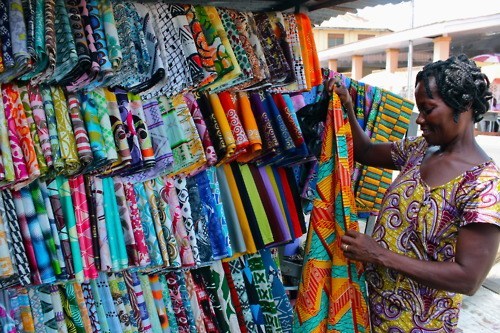The Importation Of Textile Materials Into Nigeria: A Threatened Business?
In 2013 alone, under Nigeria’s Goodluck Jonathan, the top partner countries and regions from which Nigeria Imported Textiles and Clothing included China, Japan, Brazil, Korea, Rep. and India. Here is a chart of how the transactions happened:

Let’s Contrast This with 2017 Chart

Analysis:
- The statistics above show that within a space of 4 years alone, importation of textile materials into Nigeria declined by $139,880.73.
CBN Blocks Access To FX For All Forms Of Textile Materials
Worried that Nigeria’s local textile industries are declining, the Central Bank of Nigeria recently announced that all FX dealers in Nigeria are to desist from granting any importer of textile material access to FX in the Nigerian foreign exchange market. It went further to state that it would still support the importation of cotton lint for use in textile factories, with a caveat that such importers shall begin sourcing all their cotton needs locally beginning from year 2020. It also went further to state that it would support local growers of cotton to enable them meet the needs of the textile industries in Nigeria.
The implication of this policy is that Textiles, Woven fabrics, Clothes are ineligible for Foreign Exchange at the CBN’s Official Window. This policy, although it does not totally place a ban on the importation of these items, does and will stifle access to funds by textiles and clothing importers, thus increasing the purchasing prices of imported clothing and textile materials.
Reduction Of Import Duties For Local Production Of Textile Materials
In 2017, a circular issued by the Ministry of Finance indicated that Nigeria has adopted some Supplementary Protection Measures (SPM) in line with the ECOWAS Common External Tarrif 2015 – 2019. The minister explained that the ECOWAS CET, which will cover the 2017 to 2019 fiscal periods, is composed of three categories made up of an Import Adjustment Tax list of 173 tariff lines, a national list consisting of 91 items and an import prohibition list of 25 items, which is applicable to certain goods originating from non-ECOWAS member states. Consequently, items in the national list whose import duties were reduced from 10 per cent to 5 per cent include synthetic organic colouring matter; grease for treatment of textile materials; prepared glues and adhesives, composite solvents and thinners; mixes alkylbenzenes; industrial monocarboxylic fatty acids activated carbon fats of sheep or goat; sheetspolyethylene, paper and paper board, yarn, synthetic staple fibres.
Historical Intervention in Nigeria’s Local Textile Industry In Recent Times And The Impact
In 2015, Nigeria’s government through the Ministry of Industry, Trade and Investment, launched the National Cotton, Textile and Garment Enterprise Policy to boost the textile industry. The policy initially aimed at developing the local textile industry, launched under Olusegun Olutoyin Aganga as the then Trade Minister four years ago, aimed to create an environment to encourage textile production in the country and limit importation.

The policy document projected savings of $2 billion in foreign exchange through import substitution, increase in the level of direct employment in the sector from the then 24,000 workers to 50,000 workers by the end of 2015 and to 100,000 workers by 2017. The policy also targeted an increase in seed cotton production in the short-term from 200,000 metric tonnes to 500,000 metric tonnes by the end of 2015 and indirect employment expected to increase from the current level of 650,000 people to 1 million people by 2015, and 1.3 million people by 2017. Details of the implementation of the policy however remained sketchy as it does look like the trade ministry has abandoned the policy.
Again in 2010, the Federal Government introduced the N100 billion Cotton, Textile and Garment Revival Fund managed by the Bank of Industry (BOI) to turn around the fortunes of the textile industry, but there was little or nothing to show for it.
Bottom Line:
Despite efforts in the last few years, little or nothing has been done to revive Nigeria’s local textile industry, despite government’s intervention by way of policies and programmes. In any case, local capacity for the production of textile and clothing may not be enough to meet the basic clothing needs of over 190 million Nigerians.
Indeed, the government may make all the policies to favour local textile manufacturing industries, but as long as there is no outright ban on the importation of clothing materials, the consumers would continue to bear the brunt of such policies. In short, it would be a case of increase more, pay more and more.
Charles Rapulu Udoh

Charles Rapulu Udoh a Lagos-based Lawyer with special focus on Business Law, Intellectual Property Rights, Entertainment and Technology Law. He is also an award-winning writer. Working for notable organisations so far has exposed him to some of industry best practices in business, finance strategies, law, dispute resolution and data analytics both in Nigeria and across the world.


























